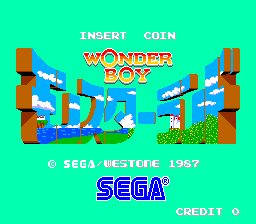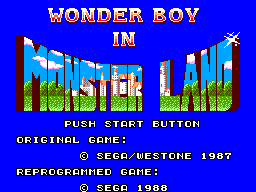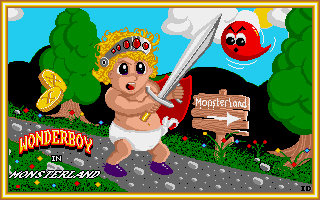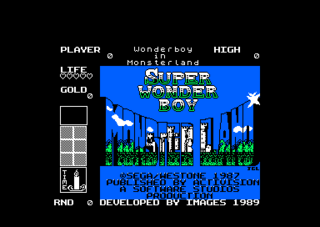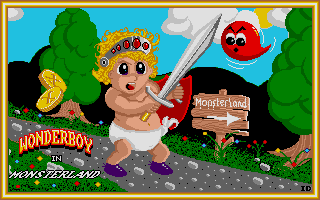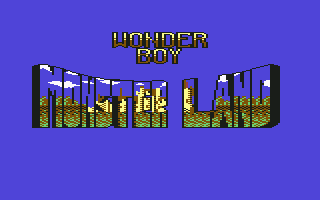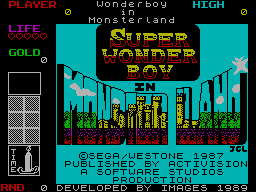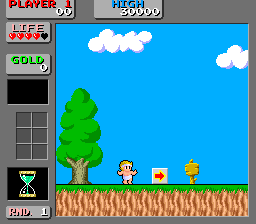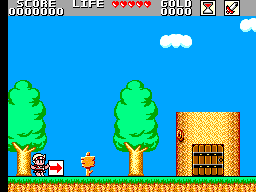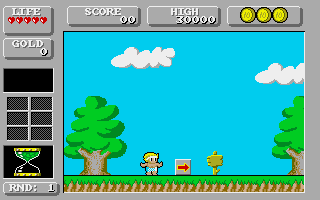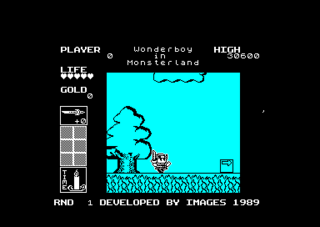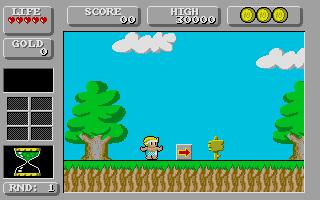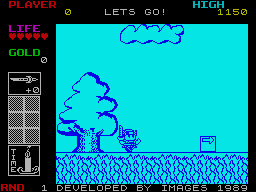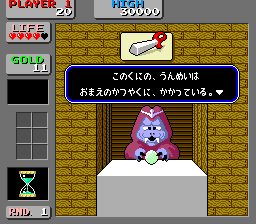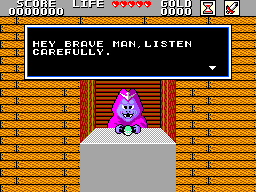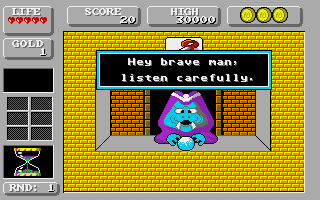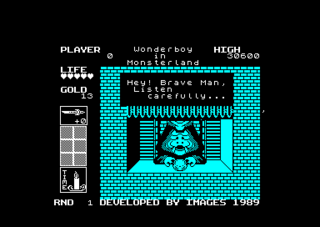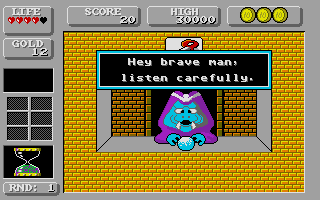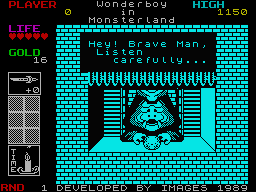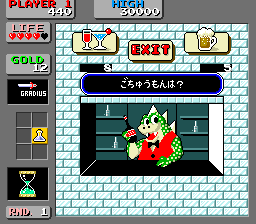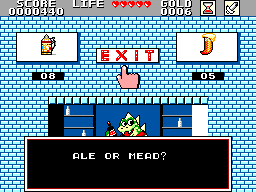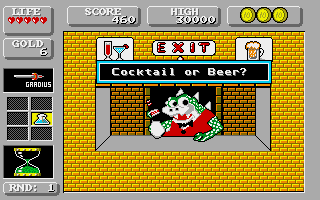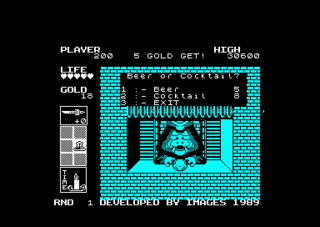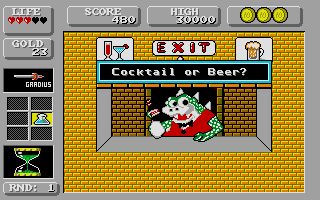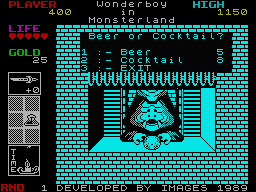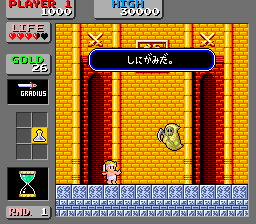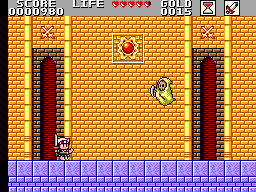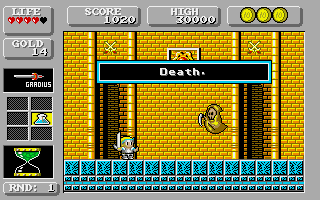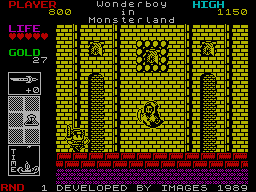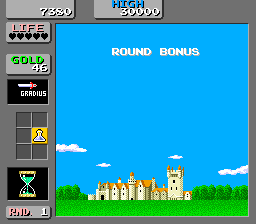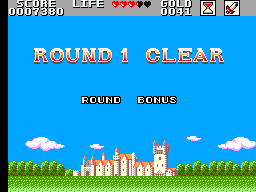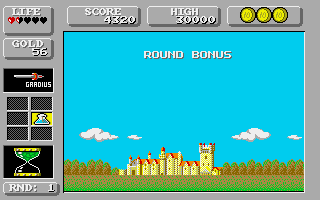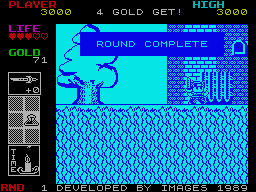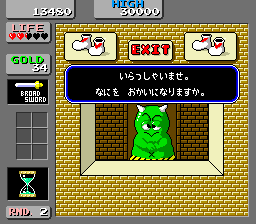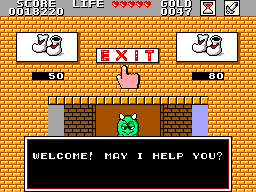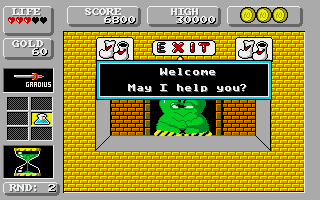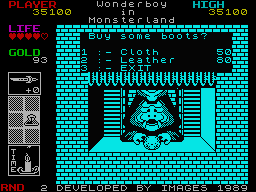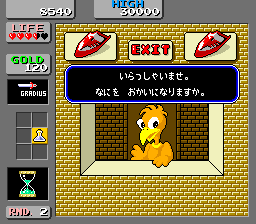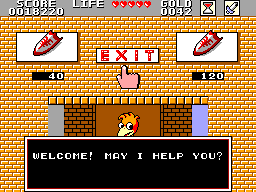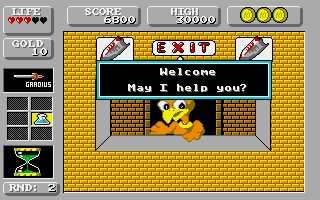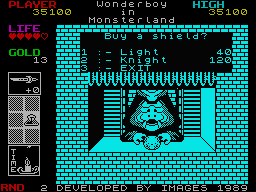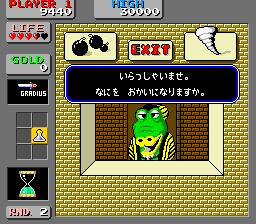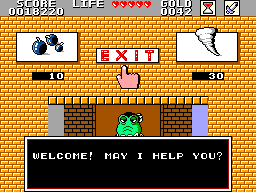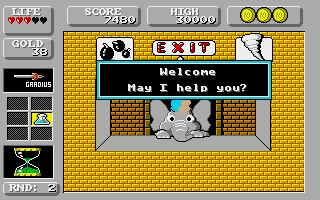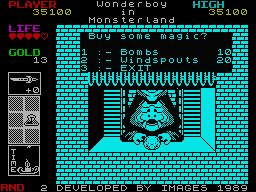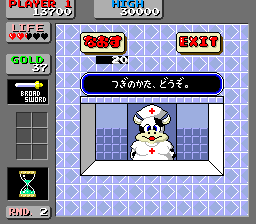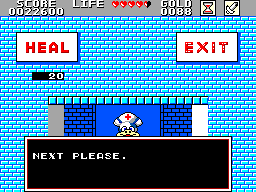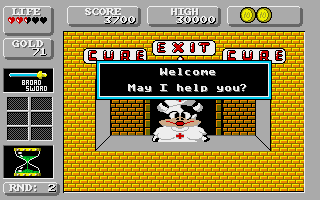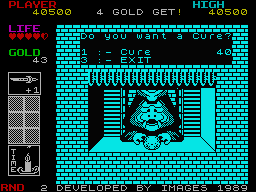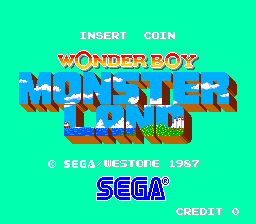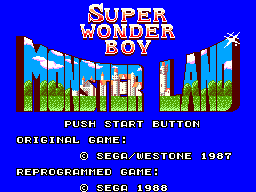Difference between revisions of "Wonder Boy in Monster Land/Comparisons"
From Sega Retro
(→Localisation comparisons: English title from digital rereleases of the arcade version) |
|||
| (7 intermediate revisions by one other user not shown) | |||
| Line 24: | Line 24: | ||
| image1=WBiML System2 Start.png | | image1=WBiML System2 Start.png | ||
| image2=WBiML SMS Start.png | | image2=WBiML SMS Start.png | ||
| − | | image3= | + | | image3=WBiML Amiga Start.png |
| image4=WBiML CPC Start.png | | image4=WBiML CPC Start.png | ||
| image5=WBiML ST Start.png | | image5=WBiML ST Start.png | ||
| Line 36: | Line 36: | ||
| game6=Commodore 64 | | game6=Commodore 64 | ||
| game7=ZX Spectrum | | game7=ZX Spectrum | ||
| − | | desc= | + | | desc=Wonder Boy is said to be a teenager in the Master System version, and is given clothes at the start of the game. In the arcades, he's barely dressed, and the home computer ports stick closer to that version. The Amstrad CPC and ZX Spectrum ports choose to forgo this brief introductory segment, giving Wonder Boy both clothes and a sword without the need to see the fortune teller (although the first moving platform still does not appear until you talk to her). |
| + | |||
| + | The 8-bit versions also choose to represent time as a burning candle for some reason. | ||
}} | }} | ||
| Line 43: | Line 45: | ||
| image1=WBiML System2 FortuneTeller.png | | image1=WBiML System2 FortuneTeller.png | ||
| image2=WBiML SMS FortuneTeller.png | | image2=WBiML SMS FortuneTeller.png | ||
| − | | image3= | + | | image3=WBiML Amiga FortuneTeller.png |
| image4=WBiML CPC FortuneTeller.png | | image4=WBiML CPC FortuneTeller.png | ||
| image5=WBiML ST FortuneTeller.png | | image5=WBiML ST FortuneTeller.png | ||
| Line 55: | Line 57: | ||
| game6=Commodore 64 | | game6=Commodore 64 | ||
| game7=ZX Spectrum | | game7=ZX Spectrum | ||
| − | | desc= | + | | desc=Despite having plenty of space on-screen, most versions of the game cover up important information when speaking to Wonder Boy. The Master System chooses to move the text below the shop owner (thus only briefly obscuring their bodies), while the Spectrum and Amstrad versions resort to a numbered list of items selectable from the keyboard. |
}} | }} | ||
| Line 62: | Line 64: | ||
| image1=WBiML System2 Tavern.png | | image1=WBiML System2 Tavern.png | ||
| image2=WBiML SMS Tavern.png | | image2=WBiML SMS Tavern.png | ||
| − | | image3= | + | | image3=WBiML Amiga Tavern.png |
| image4=WBiML CPC Tavern.png | | image4=WBiML CPC Tavern.png | ||
| image5=WBiML ST Tavern.png | | image5=WBiML ST Tavern.png | ||
| image6=Notavailable.svg | | image6=Notavailable.svg | ||
| image7=WBiML Spectrum Tavern.png | | image7=WBiML Spectrum Tavern.png | ||
| + | | game1=Arcade (System 2) | ||
| + | | game2=Master System | ||
| + | | game3=Amiga | ||
| + | | game4=Amstrad CPC | ||
| + | | game5=Atari ST | ||
| + | | game6=Commodore 64 | ||
| + | | game7=ZX Spectrum | ||
| + | | desc=No version is concerned with giving alcohol to a minor, though the Master System at least acknowledges that cocktails perhaps aren't the best fit for a classic fantasy setting. A shortage of townsfolk in the Spectrum and Amstrad versions mean the fortune teller runs every business in the game, asking questions despite the presence of her crystal ball. | ||
| + | }} | ||
| + | |||
| + | ===First Death Master=== | ||
| + | {{Comparison | ||
| + | | image1=WBiML System2 DeathMaster.png | ||
| + | | image2=WBiML SMS DeathMaster.png | ||
| + | | image3=WBiML Amiga DeathMaster.png | ||
| + | | image4=Notavailable.svg | ||
| + | | image5=Notavailable.svg | ||
| + | | image6=Notavailable.svg | ||
| + | | image7=WBiML Spectrum DeathMaster.png | ||
| + | | game1=Arcade (System 2) | ||
| + | | game2=Master System | ||
| + | | game3=Amiga | ||
| + | | game4=Amstrad CPC | ||
| + | | game5=Atari ST | ||
| + | | game6=Commodore 64 | ||
| + | | game7=ZX Spectrum | ||
| + | | desc= | ||
| + | }} | ||
| + | |||
| + | ===Round 1 clear=== | ||
| + | {{Comparison | ||
| + | | image1=WBiML System2 Round1Clear.png | ||
| + | | image2=WBiML SMS Round1Clear.png | ||
| + | | image3=WBiML Amiga Round1Clear.png | ||
| + | | image4=Notavailable.svg | ||
| + | | image5=Notavailable.svg | ||
| + | | image6=Notavailable.svg | ||
| + | | image7=WBiML Spectrum Round1Clear.png | ||
| + | | game1=Arcade (System 2) | ||
| + | | game2=Master System | ||
| + | | game3=Amiga | ||
| + | | game4=Amstrad CPC | ||
| + | | game5=Atari ST | ||
| + | | game6=Commodore 64 | ||
| + | | game7=ZX Spectrum | ||
| + | | desc=Only the Master System points out which round has been cleared at the end of a stage. The Spectrum and Amstrad versions don't get separate screens. | ||
| + | }} | ||
| + | |||
| + | ===Boot shop=== | ||
| + | {{Comparison | ||
| + | | image1=WBiML System2 BootShop.png | ||
| + | | image2=WBiML SMS BootShop.png | ||
| + | | image3=WBiML Amiga BootShop.png | ||
| + | | image4=Notavailable.svg | ||
| + | | image5=Notavailable.svg | ||
| + | | image6=Notavailable.svg | ||
| + | | image7=WBiML Spectrum BootShop.png | ||
| + | | game1=Arcade (System 2) | ||
| + | | game2=Master System | ||
| + | | game3=Amiga | ||
| + | | game4=Amstrad CPC | ||
| + | | game5=Atari ST | ||
| + | | game6=Commodore 64 | ||
| + | | game7=ZX Spectrum | ||
| + | | desc= | ||
| + | }} | ||
| + | |||
| + | ===Shield shop=== | ||
| + | {{Comparison | ||
| + | | image1=WBiML System2 ShieldShop.png | ||
| + | | image2=WBiML SMS ShieldShop.png | ||
| + | | image3=WBiML Amiga ShieldShop.png | ||
| + | | image4=Notavailable.svg | ||
| + | | image5=Notavailable.svg | ||
| + | | image6=Notavailable.svg | ||
| + | | image7=WBiML Spectrum ShieldShop.png | ||
| + | | game1=Arcade (System 2) | ||
| + | | game2=Master System | ||
| + | | game3=Amiga | ||
| + | | game4=Amstrad CPC | ||
| + | | game5=Atari ST | ||
| + | | game6=Commodore 64 | ||
| + | | game7=ZX Spectrum | ||
| + | | desc= | ||
| + | }} | ||
| + | |||
| + | ===Magical shop=== | ||
| + | {{Comparison | ||
| + | | image1=WBiML System2 MagicalShop.png | ||
| + | | image2=WBiML SMS MagicalShop.png | ||
| + | | image3=WBiML Amiga MagicalShop.png | ||
| + | | image4=Notavailable.svg | ||
| + | | image5=Notavailable.svg | ||
| + | | image6=Notavailable.svg | ||
| + | | image7=WBiML Spectrum MagicalShop.png | ||
| + | | game1=Arcade (System 2) | ||
| + | | game2=Master System | ||
| + | | game3=Amiga | ||
| + | | game4=Amstrad CPC | ||
| + | | game5=Atari ST | ||
| + | | game6=Commodore 64 | ||
| + | | game7=ZX Spectrum | ||
| + | | desc=For some reason the magic shop is owned by a small elphant in the Amiga and Atari ST versions, rather than the usual crocodile. | ||
| + | }} | ||
| + | |||
| + | ===Hospital=== | ||
| + | {{Comparison | ||
| + | | image1=WBiML System2 Hospital.png | ||
| + | | image2=WBiML SMS Hospital.png | ||
| + | | image3=WBiML Amiga Hospital.png | ||
| + | | image4=Notavailable.svg | ||
| + | | image5=Notavailable.svg | ||
| + | | image6=Notavailable.svg | ||
| + | | image7=WBiML Spectrum Hospital.png | ||
| + | | game1=Arcade (System 2) | ||
| + | | game2=Master System | ||
| + | | game3=Amiga | ||
| + | | game4=Amstrad CPC | ||
| + | | game5=Atari ST | ||
| + | | game6=Commodore 64 | ||
| + | | game7=ZX Spectrum | ||
| + | | desc=This cow has merged with the desk in the Amiga and Atari ST versions of the game, and offers two different options to "cure". | ||
| + | }} | ||
| + | |||
| + | ===Game over=== | ||
| + | {{Comparison | ||
| + | | image1=Notavailable.svg | ||
| + | | image2=Notavailable.svg | ||
| + | | image3=Notavailable.svg | ||
| + | | image4=Notavailable.svg | ||
| + | | image5=Notavailable.svg | ||
| + | | image6=Notavailable.svg | ||
| + | | image7=Notavailable.svg | ||
| game1=Arcade (System 2) | | game1=Arcade (System 2) | ||
| game2=Master System | | game2=Master System | ||
| Line 78: | Line 213: | ||
==Localisation comparisons== | ==Localisation comparisons== | ||
| + | ===System 2 version=== | ||
| + | {{Comparison | ||
| + | | image1=WBML Title.png | ||
| + | | image2=WBiML System2 US Title.png | ||
| + | | game1=Japanese version | ||
| + | | game2=Western versions | ||
| + | | desc= | ||
| + | }} | ||
| + | |||
===Master System version=== | ===Master System version=== | ||
| + | {{Comparison | ||
| + | | image1=Notavailable.svg | ||
| + | | image2=Notavailable.svg | ||
| + | | game1=JP version | ||
| + | | game2=US/EU versions | ||
| + | | desc=The Japanese version shows a Sega Mark III logo when the game boots. | ||
| + | }} | ||
| + | |||
{{Comparison | {{Comparison | ||
| image1=WBiML SMS JP Title.png | | image1=WBiML SMS JP Title.png | ||
| Line 86: | Line 238: | ||
| desc= | | desc= | ||
}} | }} | ||
| + | |||
==References== | ==References== | ||
<references /> | <references /> | ||
{{WBMLOmni}} | {{WBMLOmni}} | ||
Latest revision as of 12:21, 9 May 2021
- Back to: Wonder Boy in Monster Land.
Contents
Version comparisons
Title screen
| Arcade (System 2) |
|---|
| Master System |
|---|
| Amiga |
|---|
| Amstrad CPC |
|---|
| Atari ST |
|---|
| Commodore 64 |
|---|
| ZX Spectrum |
|---|
Start
| Arcade (System 2) |
|---|
| Master System |
|---|
| Amiga |
|---|
| Amstrad CPC |
|---|
| Atari ST |
|---|
| Commodore 64 |
|---|
| ZX Spectrum |
|---|
Wonder Boy is said to be a teenager in the Master System version, and is given clothes at the start of the game. In the arcades, he's barely dressed, and the home computer ports stick closer to that version. The Amstrad CPC and ZX Spectrum ports choose to forgo this brief introductory segment, giving Wonder Boy both clothes and a sword without the need to see the fortune teller (although the first moving platform still does not appear until you talk to her).
The 8-bit versions also choose to represent time as a burning candle for some reason.
Fortune teller
| Arcade (System 2) |
|---|
| Master System |
|---|
| Amiga |
|---|
| Amstrad CPC |
|---|
| Atari ST |
|---|
| Commodore 64 |
|---|
| ZX Spectrum |
|---|
Despite having plenty of space on-screen, most versions of the game cover up important information when speaking to Wonder Boy. The Master System chooses to move the text below the shop owner (thus only briefly obscuring their bodies), while the Spectrum and Amstrad versions resort to a numbered list of items selectable from the keyboard.
Tavern
| Arcade (System 2) |
|---|
| Master System |
|---|
| Amiga |
|---|
| Amstrad CPC |
|---|
| Atari ST |
|---|
| Commodore 64 |
|---|
| ZX Spectrum |
|---|
No version is concerned with giving alcohol to a minor, though the Master System at least acknowledges that cocktails perhaps aren't the best fit for a classic fantasy setting. A shortage of townsfolk in the Spectrum and Amstrad versions mean the fortune teller runs every business in the game, asking questions despite the presence of her crystal ball.
First Death Master
| Arcade (System 2) |
|---|
| Master System |
|---|
| Amiga |
|---|
| Amstrad CPC |
|---|
| Atari ST |
|---|
| Commodore 64 |
|---|
| ZX Spectrum |
|---|
Round 1 clear
| Arcade (System 2) |
|---|
| Master System |
|---|
| Amiga |
|---|
| Amstrad CPC |
|---|
| Atari ST |
|---|
| Commodore 64 |
|---|
| ZX Spectrum |
|---|
Only the Master System points out which round has been cleared at the end of a stage. The Spectrum and Amstrad versions don't get separate screens.
Boot shop
| Arcade (System 2) |
|---|
| Master System |
|---|
| Amiga |
|---|
| Amstrad CPC |
|---|
| Atari ST |
|---|
| Commodore 64 |
|---|
| ZX Spectrum |
|---|
Shield shop
| Arcade (System 2) |
|---|
| Master System |
|---|
| Amiga |
|---|
| Amstrad CPC |
|---|
| Atari ST |
|---|
| Commodore 64 |
|---|
| ZX Spectrum |
|---|
Magical shop
| Arcade (System 2) |
|---|
| Master System |
|---|
| Amiga |
|---|
| Amstrad CPC |
|---|
| Atari ST |
|---|
| Commodore 64 |
|---|
| ZX Spectrum |
|---|
For some reason the magic shop is owned by a small elphant in the Amiga and Atari ST versions, rather than the usual crocodile.
Hospital
| Arcade (System 2) |
|---|
| Master System |
|---|
| Amiga |
|---|
| Amstrad CPC |
|---|
| Atari ST |
|---|
| Commodore 64 |
|---|
| ZX Spectrum |
|---|
This cow has merged with the desk in the Amiga and Atari ST versions of the game, and offers two different options to "cure".
Game over
| Arcade (System 2) |
|---|
| Master System |
|---|
| Amiga |
|---|
| Amstrad CPC |
|---|
| Atari ST |
|---|
| Commodore 64 |
|---|
| ZX Spectrum |
|---|
Localisation comparisons
System 2 version
| Japanese version |
|---|
| Western versions |
|---|
Master System version
| JP version |
|---|
| US/EU versions |
|---|
The Japanese version shows a Sega Mark III logo when the game boots.
| JP |
|---|
| US/EU |
|---|
References
| Wonder Boy in Monster Land | |
|---|---|
|
Main page | Comparisons | Maps | Achievements | Hidden content | Bugs | Development | Magazine articles | Reception | |
